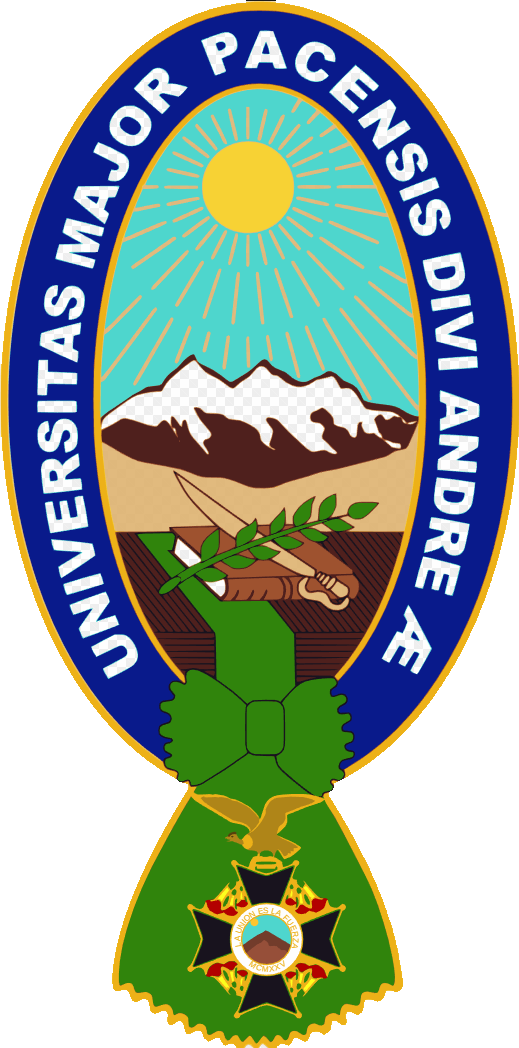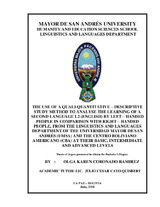Mostrar el registro sencillo del ítem
The use of a quali-quantitative – descriptive study method to analyse the learning of a second language l2 (english) by left – handed people in comparison with right – handed people, from the linguistics and languages Department of the Universidad Mayor de San Andrés (UMSA) and The Centro Boliviano Americano (CBA) at their basic, intermediate and advanced levels
| dc.contributor.author | Coronado Ramirez, Olga Karen | |
| dc.contributor.author | Cayo Quisbert, Julio Cesar (Tutor) | |
| dc.date.accessioned | 2018-07-26T23:16:54Z | |
| dc.date.available | 2018-07-26T23:16:54Z | |
| dc.date.issued | 2018-06 | |
| dc.identifier.citation | Tesis de Grado | es_ES |
| dc.identifier.uri | http://repositorio.umsa.bo/xmlui/handle/123456789/17006 | |
| dc.description.abstract | The following research has been done in order to inquire about the influence of being lefthanded on a Second Language learning process and in all its abilities: Listening, Speaking, Reading and Writing. Thus, our goal was to show the differences of left-handed people, in learning a Second Language L2, in this case English, compared with right-handed people. The following universe was chosen to examine the degree of difference between the Linguistics and Languages Department of the Universidad Mayor de San Andrés and the Centro Boliviano Americano of the city of La Paz in their Basic, Intermediate and Advanced levels. Based on the results obtained we were able to confirm our hypothesis, namely that the degree of difference is greater in left-handed people relative to right-handed people. In this respect, a series of techniques or methods was chosen to use in order to carry out the proposed research, whereby the proposal was to study the differences in the learning of a Second Language by left and right-handed students in our study universe. Such techniques were the qualitative, descriptive and comparative methods, which allowed us to reach the general and specific objectives proposed. This study was considered into a descriptive method because the descriptive investigations are those whose main objective is to gather all existing material about the problem being studied. This study is also considered a qualitative method because it is the measurement method preferably used in social investigations, according (F.Rodriguez, L. Barrios, M. Fuentes, 1994). Consequently, our study universe was divided into two groups of students in the stage of acquisition of the Second Language: left-handed and right-handed. In turn, these groups were sub divided into two groups of three levels, the first group belonged to the Universidad Mayor de San Andrés (UMSA) and the second group belonged to the Centro Boliviano Americano (CBA). These groups were, themselves, sub-classified into three levels: Beginners, Intermediates, and Advancers, corresponding to each Study Center, thus leaving two groups in three levels. In both groups, left-handed and right-handed people were considered for our study. Finally, considering the information gathered by this study, it can be concluded that the Hypothesis raised in the Research Design has been confirmed. Left-handed individuals possess, in general, a greater degree of skill in learning languages compared to right-handed people, most likely as a result of the way their brains function. | es_ES |
| dc.language.iso | en | es_ES |
| dc.subject | MÉTODOS DE ESTUDIO INGLES | es_ES |
| dc.subject | INGLES SEGUNDO IDIOMA | es_ES |
| dc.title | The use of a quali-quantitative – descriptive study method to analyse the learning of a second language l2 (english) by left – handed people in comparison with right – handed people, from the linguistics and languages Department of the Universidad Mayor de San Andrés (UMSA) and The Centro Boliviano Americano (CBA) at their basic, intermediate and advanced levels | es_ES |
| dc.type | Thesis | es_ES |

